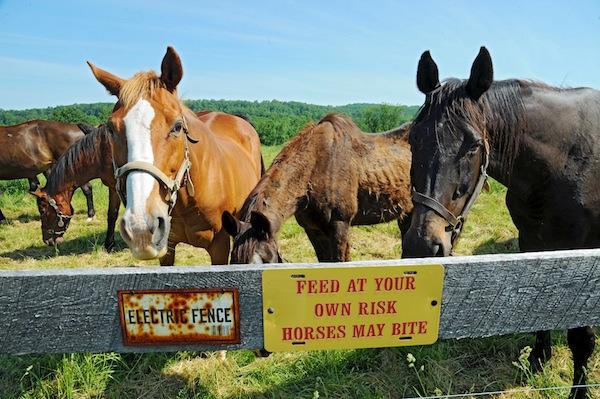“I don’t know why someone would eat a horse. I’ve never really heard of that before.”
This was the thought that perplexed Valerie Fitton ’14 when she learned of the passage of federal Spending Bill H.R. 2112, which legalizes the slaughtering of horses for human consumption.
Since 2006, Congress has prohibited the regulation and inspection of horses for domestic slaughter. However, the new agricultural spending bill, which President Barack Obama signed on Nov. 18, does not contain any language preventing the slaughter of horses.
In a statement on Nov. 29, the U.S. Department of Agriculture (USDA) said that there are currently no slaughterhouses in the United States that butcher horses.
When Grace McDavid-Seidner ’13 heard that this law had been passed, she says she became genuinely upset, especially since she had not heard anything regarding such a decision prior to the law’s passage.
“I think it was unnecessary, and lifting the ban on horse meat seems extremely backwards to me,” said McDavid-Seidner, who says she does not condone the consumption of any meat.
Some students like Rusty Schindler ’13 believe that condoning horse slaughter is horrifying due to the image of horses that has been portrayed in the media.
“Horses have become somewhat iconic through movies, television, and people’s history of simply riding them,” Schindler said. “They are definitely not meant to be eaten; that just seems cruel and disgusting.”
The image of a horse is also beautiful to Emily Nuzzo ’13, who has been horseback riding for over 10 years.
“They are extremely strong but gentle animals. It sounds weird, but they legitimately understand humans; they can sense emotions, and they react to that,” Nuzzo said. “Slaughtering horses is awful and unfair. It just shouldn’t happen.”
Schindler adds that a law like this came out of the blue, since there are several other issues pressing the nation, such as the economy and the Occupy protests.
Bryan Gannon ’14 was also shocked to hear that horses may be slaughtered in the United States, due to the fact that many American families own horses as pets.
“It’s like killing a family’s dog rather than killing some random animal that nobody can connect to,” Gannon said. “And besides, killing horses is just weird for some reason.”
According to a Nov. 30 Time.com article, pro-slaughter activists predict that horse slaughterhouses may be up and running in as little as a month.
Schindler says that there is a cuteness factor that also comes into play when looking at animals used for human consumption.
“Horses are cuter than chickens and turkeys,” he said. “Simple as that.”
















































Karla Boyd • Dec 3, 2011 at 1:04 am
The government rounds up wild horses, only so many can be adopted, so President Obama has given Sue Wallis the ability to get rid of all the wild horses rounded up. There is not a demand for horse meat in the US its an export business profitable to whomever provides the product.
When have humans put the animals above their own greed? Never!!
This country has the resources to support itself we do not need to import what we can already provide this would put Americans back to work and would save the farms for the farmers.
Americans do not want to consume horse meat the demand is outside the borders why don’t they provide their own resources because our presidents feel its up to us to support other countries instead of taking care of our own and with the surplus of wild horses this is the only answer they can come up with.
If people are unable to support their horse there is no reason they have to starve it to death, either have it euthanized humanely or give it to a rescue place to find it a new home.
There is not a slaughterhouse around that humanely kills horses period.
Since the President and so many representatives claim to be pro animal this should not of passed.
Suzanne Moore • Dec 2, 2011 at 2:48 pm
This didn’t come out of nowhere. Those who feel they can make money from slaughtering horses have been trying to get this done ever since the domestic plants were defunded for inspection of slaughter of horses for HUMAN CONSUMPTION – this is all that is affected. If there were a market, horses could still be slaughtered for non-human food use. There isn’t a market there either, of course, because U.S. horses are not food producing animals, so they are not raised under the strict regulations required for a food producing animal. Horse products – both prescription and over-the-counter contain a myriad of ingredients that if used on a horse make that horse PERMANENTLY ineligible for the human food chain. Simply put, our horses are not safe for people to eat. Horse meat isn’t even used in pet food any more because of contamination. We won’t feed it to our dogs, but we’re fine with feeding to humans overseas. Isn’t there something VERY wrong with this picture?
Even if plants open here, none of the horses will pass our own Food Safety rules – just like they don’t pass the Food Safety Rules of our customers abroad. Their rules are being flagrantly flouted and they know it.
Horse eating countries have a very strict traceability system called the passport system. We have absolutely nothing because there is no need – Americans do not eat horses. If we are to continue slaughtering horses for human consumption, we will have to implement a system comparable to the passport system or our main customer, the European Union, will not accept our horse meat – period.
Just refunding the USDA inspections will cost tax payers 5 million dollars a year at least. If they were to do the testing that is REALLY required to detect the banned substances, it would not only cost tax payers a fortune, it would slow down production enough to put the plant out of business almost instantly. None of this is reasonable or practical.
I have no idea how much implementing our own passport comparable system would cost, but it would be a LOT – again, tax payers footing the bill for something the majority of them hate.
The economy has hurt the horse business and owners, that’s for sure. I mean, I own two horses now and have owned horses for 35 years. However, slaughter has proven to be no solution to the so-called “excess” horse problem.
There are bills in Congress NOW that would end both domestic slaughter and shipping horses across borders for the purpose of slaughter. The American people oppose horse slaughter by about 70%-80% and have for decades, but the pro-slaughter groups have deep pockets and can just purchase Congressmen to block every bill that comes up. This is the fourth or fifth try. We get closer every time though, and eventually, we WILL get it passed. If the EU doesn’t shut up down first.
House version: H.R. 2966 http://www.govtrack.us/congress/bill.xpd?bill=h112-2966
Senate version: S. 1176 http://www.govtrack.us/congress/bill.xpd?bill=s112-1176
Both are The American Horse Slaughter Prevention Act of 2011 and are supported by about 80% of Americans – the ones who even KNOW about it that is. As you see, most Americans don’t even know horse slaughter for human consumption is going on.
This legislation addresses horse slaughter for HUMAN CONSUMPTION only.
Cam Newton • Dec 1, 2011 at 7:22 pm
Who cares?